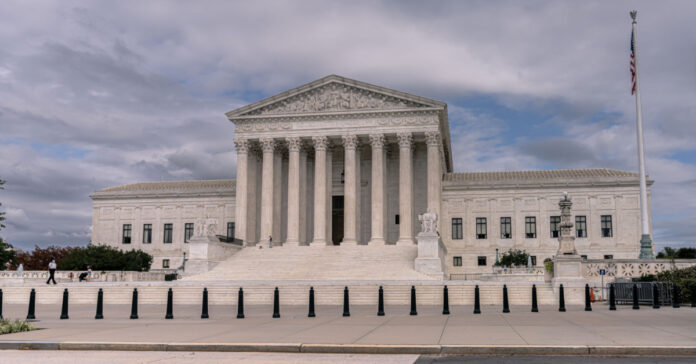All my life, the Supreme Court has been liberal or at least leaned liberal, often with one or two justices holding the swing votes. As a result, the country has been moving away from the founder’s intent in which the Congress legislates, the President is the Chief Executive, and the Courts enforce the rules. For decades, the court has allowed the government, especially the fourth branch of government, to overstep the limits of the Constitution and exceed their authority. In this term, the Supreme Court finally started to cut back on those excesses and curtail the power of the Federal Government.
What, you ask, is the fourth branch of government? It is the rule-making agencies and their bureaucracies, that alphabet soup of well-known agencies like the IRS and the EPA and the lesser-known agencies like the Minerals Management Agency and Bureau of Ocean Energy Management. The problem is not their existence, per se, but their tendency to be given an inch and take a mile. That is what the EPA did when it took a law passed in 1970 and continuously expanded their powers beyond what the statue said.
Stopping Overreach and Returning to our Founders Intent
When they can’t get the congress to pass a law they want, presidents often turn to executive orders and order these agencies to change how they act. This recent ruling should act on a restraint on those executive orders. It should also cause agencies like the Securities and Exchange Commission to reconsider some of their rulings. It certainly gives those who are regulated by alphabet agencies a new opportunity to push back and sue the agency in question.
The new court isn’t conservative; they are originalist, and that’s good enough for me. Rather than rule for politics they endorse, the new majority on the Court rules for what the Constitution says and what the Founders expressed as their intent. For example:
The Court overturned New York’s restrictions on concealed carry permits because the right to “keep and bear arms” is explicitly included in the Constitution, along with the words “shall not be infringed.”
They took the decision on abortion out of the Federal Government’s hands and sent it back to the states to be decided on a state-by-state basis because abortion is not covered in the Constitution. It is therefore left up to the “states… or to the people” as specified in the 10th Amendment.
And they found for the Biden Administration regarding their ability to overturn a Trump immigration policy because doing so was within the powers the president was granted by the Constitution.
Protecting the 2nd Amendment
It will be interesting to see how its crackdown on agencies writing rules that exceed the powers given to them by Congress will affect the BATFE, folks who many would argue have overstepped the powers granted to them by Congress in the National Firearms Act of 1934 and the Gun Control Act of 1968. For example, based on the logic of West Virginia v. EPA, the BATFE ban on bump stocks (an item not covered in the laws) appears to be something that should be overturned. The agency’s desire to eliminate ghost guns and prohibit the sale of 80-percent receivers could also be subject to further scrutiny and likely litigation, as could any new policies they come up with regarding AR-15 pistols.
Agencies are often created to manage one particular area, and because of mission creep, they expand their domain to include anything even vaguely related. For example, the EPA was given limited regulatory powers over navigable waterways, yet they want to control a farmer who digs a ditch or builds a pond. More rules mean bigger budgets, a larger staff, and more power, and what bureaucrat doesn’t want more power?
Too Much Government Regulation
Rulings by agencies like the IRS and the FDA can create entire new branches of law and change behavior, often granting them more power than the congress ever imagined. A tax change, for example, can create more work for accountants and lawyers and new tax shelters and loopholes.
We have too much government, too much regulation, and too many rules; there is little need to create more. Here’s an article from the Associated Press that touches upon the many ways the government is involved in your life from the moment you wake up in the morning until you turn out the light that night.
I’ve long believed that laws that seek to keep us safe in spite of ourselves and that compensate for stupidity should be eliminated, especially if those laws don’t protect the public. I’m fine requiring children to be in baby seats and wear seat belts, but once you are legally an adult, I think you have the right to decide whether you need a seat belt or want to wear a helmet on your motorcycle. It’s your life. I’m not going to stop you from parachuting, hang gliding, rock climbing, and doing risky stunts on snowboards or motorcycles; why should I care about protecting you in your car? And why is that the government’s business? Not wearing your seat belt increases your chance of death, whereas driving drunk increases your chance of killing others. I see those as two different things.
Get the Government’s Nose out of My Business
The government sticks its nose (and too often its fingers to pick your pocket) into too many places where it doesn’t belong. This whole concept of freedom and liberty disappears when everything you do and every decision you make has already been decided by government regulation.
I think the free market—if we let it be free—would take care of many of these problems that the government wants to regulate out of existence. If you build a car that lacks certain safety features, your competition will make that clear and the market will know it. That gives the consumer the chance to decide: Buy a cheap car or a safe car? I think people should be free to vote with their dollars and the government should get out of the way and let them. Let the market decide; regulation is just interference that makes the market less efficient and drives up costs.
If I want to buy raw milk from my neighbor’s cow or goat, why should the government want to stop the sale? Is it for my protection or the protection of big dairy farmers who have lobbyists? If my friend down the road wants to buy eggs from me before I wash them, why is that a violation of state regulations to sell them dirty eggs? If you opened a box of eggs in the grocery store and they were covered with chicken poop, you would go “eww!” and look for another brand. Do we need the government to enforce the sale of clean eggs? Likewise, if my neighbor has an old .30-30 rifle he wants to sell me, why should a private transaction between two private parties who live in the same state be regulated by the Federal Government?
States’ Rights
I think it makes sense that state have their own distinct laws. Our country is so diverse; the government in Florida is going to have different concerns than a government in Kansas, Arizona, or Idaho. I’d rather see more decisions left to the states and let the Federal Government stick to what it’s supposed to do rather than try to use the excuse of intrastate commerce to increase regulations and enforce their idea of what is “good for us” for our own good.
If the state in which you reside has laws you don’t like, then move to a state with laws you like or at least dislike less. There are states like Maryland, New Jersey, and Massachusetts where I won’t live, or even drive through, because of their gun laws. People and businesses move every day to get away from states with high income taxes. I know people in Southern Pennsylvania who shop in nearby Delaware because the taxes are lower and the liquor is cheaper. People decide where to retire based in part on how government pensions are taxed and how their estates are taxed upon their death. People move across town or another county to find a better school system. Vote for candidates who you think will help change your state’s laws, and if that doesn’t work, then vote with your feet and move.
Vote with Your Feet
When we moved, we looked at taxes and gun laws. For example, Tennessee has no income tax, but their sales tax can reach 10 percent. We did not think to look at the different state’s gas taxes. Some states add a fixed amount of tax, like 26 cents per gallon. Other states have a percentage. When gas prices double, you’re better off in a state with a fixed tax. We also looked at politics, what percentage of the state voted red versus blue in the past two or three elections, and how our county voted.
It’s educational to look at states and cities with different policies. Look at what has happened to liberal cities that defunded the police. Crime shot up, murders spiked, and now stores are leaving because they have been robbed too many times. Well, you got what you voted for.
I’ve lived in cities where the police may not engage in car chases unless it’s a murder or shooting suspect. As a result, criminals would flee the scene of a crime, and as long as they were driving a stolen car, they’d get away. In my new county, they will not only chase you, the State police and nearby agencies will help.
Look at states where weed is legal. We know hospitalizations are up, but is there a correlation between states where weed is legal and no one wants to work? It wouldn’t surprise me if the wide availability of pot results in a whole host of social and other unintended consequences.
If you decide to move, don’t just look at how far you can get from the Interstate or how cheap the land is. Pay attention to the political climate, how the local sheriff and magistrate treat crimes and criminals, and how it is likely to change over the next ten or twenty years.
Moving Forward
I think the Supreme Court is one of the few institutions that can slow our downward spiral. Unfortunately, it’s a slow, deliberate process that can take years. We may not have that much time. Let’s just hope Biden loses his majority in the Senate and House before they can push through any changes to the Supreme Court structure.







